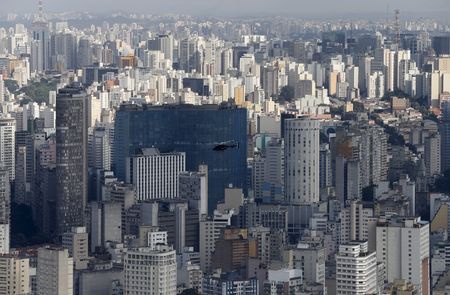By Marcela Ayres and Bernardo Caram
BRASILIA (Reuters) – Brazil’s incoming government effort to exempt nearly 200 billion reais ($37 billion) of spending from a constitutional budget cap could push public debt to record levels and force a monetary policy shift, warned economists and investors.
The proposal now under consideration in Congress has stoked concerns about President-elect Luiz Inacio Lula da Silva’s policies, divided his transition team and triggered a sharp sell-off in financial markets.
Brazil’s currency tumbled nearly 5% against the U.S. dollar this month, the third-worst performer among 152 global currencies tracked by Refinitiv. The benchmark Bovespa stock index was down 6%.
Lula’s Brasilia transition team did not respond to a request for comment, but the president-elect’s comments during the United Nations climate summit in Egypt suggested he was not reconsidering.
“Oh, but if I talk the stock market will fall and the dollar will gain. Patience,” he said, saying market swings did not reflect the views of “serious people” but of “speculators.”
Alberto Ramos, head of Latin American research at Goldman Sachs, said Lula’s proposed constitutional amendment would be “a very poor and risky start” for his government, which begins on Jan. 1.
The proposal could raise Brazil’s gross debt to 90% of gross domestic product by the end of Lula’s four-year term, from 77% currently, Ramos estimated. That would surpass the October 2020 peak of 89% in the central bank series dating back to 2006.
“It reduces the degree of freedom for the central bank to manage monetary policy,” said Ramos. At best, it could delay rate cuts, added Ramos, at the extreme, it could lead to more central bank rate hikes.
Brazil’s central bank has held interest rates at 13.75% since August, after 12 straight hikes that lifted rates from a 2% record low in March 2021. Central bank chief Roberto Campos Neto has said fiscal policy is crucial to keeping a lid on inflation.
Lula campaigned openly against the constitutional spending cap that limits spending growth to inflation. His economic advisors have suggested alternative fiscal rules, but Lula has stayed quiet about those ideas and who will run economic policy in his administration, putting markets on edge.
Meanwhile, his transition team has pushed ahead with 2023 budget negotiations, proposing a constitutional amendment that removes the Bolsa Familia welfare program from the spending cap indefinitely, opening space for 175 billion reais in new spending. The proposal also removes some public investments from the cap, opening space for another 23 billion reais in public spending next year.
Four economists named to an economic policy working group on Lula’s transition team, including two key architects of 1990s reforms, did not take part in the 2023 budget negotiations, according to a public statement from the group on Monday.
One of them, former central bank chief Persio Arida, called the proposed constitutional amendment unnecessary on Tuesday.
Another member of that policy quartet, Guilherme Mello defended the proposal as a way to ensure stable welfare benefits to poor Brazilians throughout Lula’s term.
“Nothing prevents you from discussing the situation of the Brazilian fiscal framework in the coming years,” he said in a late Wednesday television interview.
Juliana Damasceno, an economist at consultancy Tendencias, forecast Brazil’s gross debt at 90% of GDP in 2026 and has changed the outlook of her economic projections from “neutral” to “pessimistic” based on the latest policy signals.
“We start to have a higher risk pricing, this affects our assets, which end up depreciating, affecting interest rates and inflation, which will demand an even stricter (fiscal anchor) rule,” she said.
($1 = 5.4710 reais)
(Reporting by Marcela Ayres and Bernardo Caram; Additional reporting by Lisandra Paraguassu; Editing by Brad Haynes and Josie Kao)

